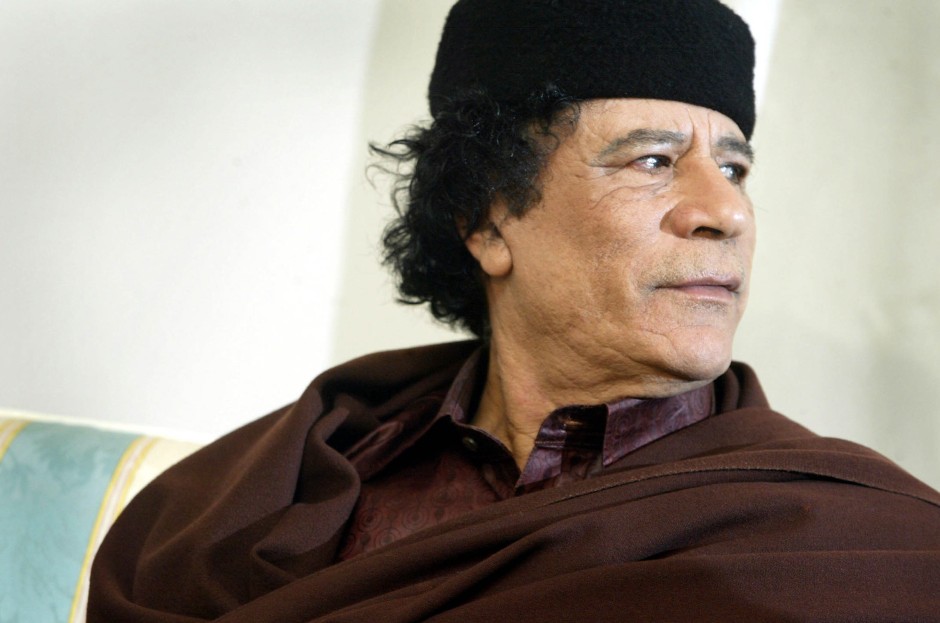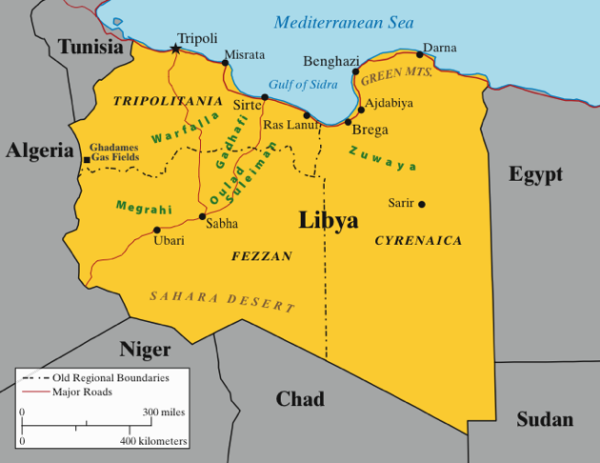Three years after its authoritarian government fell in a violent popular uprising aided and abetted by foreign intervention, Libya has descended into a state of anarchy that bodes ill for its future as a united nation.
Torn by tribal rivalries, infighting among competing armed militias and a spate of assassinations and kidnappings, and weakened by the glaring absence of a strong central government, Libya is undergoing a rocky transition from autocracy to democracy.
Adrift since the outbreak of a brief civil war and the murder of its long-time eccentric leader, Mouammar Gaddafi, Libya is struggling as its post-revolutionary transitional government grapples with the tasks of writing a constitution and holding new elections before a new parliament is sworn in by the end of this year.
Once a Roman and Italian colony, and a battle ground during World War II, Libya declared independence in December 1951 as a constitutional monarchy under the rule of King Idris I.
On Sept. 1, 1969, a small group of army officers spearheaded by Gaddafi, 27, staged a coup d’etat, abolishing the monarchy, nationalizing the oil and gas industries — the cornerstone of Libya’s economy — and forcing the United States to vacate its military bases.
Under Gaddafi, Libya vied for leadership in the Arab world, ardently supported the Palestinian cause, clashed with the United States and Europe and extended its influence into Africa.
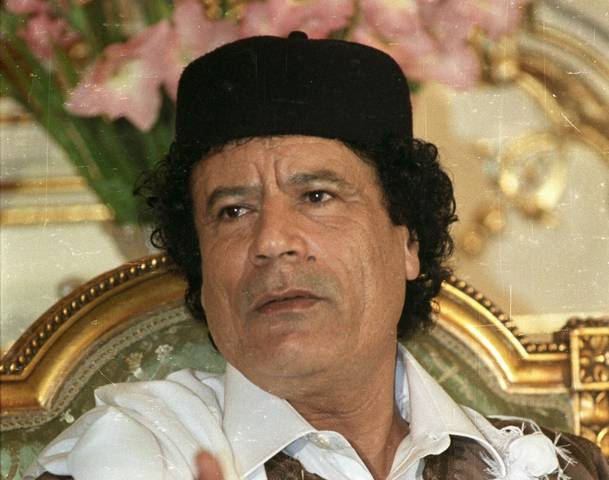
Consolidating his power by means of patronage, intimidation, brute force and public works and social welfare programs that materially improved the lives of ordinary Libyans, he kept together a fractious nation riven by tribalism. For 42 years, Gaddafi provided the sort of stifling and suffocating stability and continuity for which Saddam Hussein of Iraq was infamous.
Gaddafi might have died peacefully in office, a hero in his nation, had it not been for the Arab Spring rebellions that swept through the region in 2011, first in neighboring Tunisia and Egypt, and then in Libya.
Fed by discontent with the stultifying status quo, with its reliance on authoritarianism, corruption and cronyism, the revolt in Libya erupted in mid-February in the western city of Benghazi, a redoubt of opposition to Gaddafi’s regime, and gradually spread westward to the capital, Tripoli.
Reflexively, Gaddafi attempted to crush the revolution by the usual police state methods, but to no avail. On Feb. 27, a coalition of dissidents formed the Transitional Council, an administrative body headed by Libya’s former justice minister. From that moment onward, the momentum began shifting to the rebels.
The turning point occurred on March 17, when the United Nations’ Security Council passed a resolution sanctioning the establishment of a no-fly zone in Libya and the use of “all means necessary” to protect Libyan civilians caught in the cross fire.
Much to the indignation of Russia and China, two of Gaddafi’s principal backers, the United States and its NATO allies, mainly Britain and France, used the UN resolution to launch an aerial bombing campaign in support of the poorly-armed rebels, who were really no match for Libya’s armed forces. Thanks to this assistance, the rebels finally prevailed, capturing Tripoli on Aug. 22.
Gaddafi and his loyalists, who had cynically portrayed the rebels as terrorists and pawns of Western imperialism, fought on, making their last stand in his home town in central Libya, Sirte.
Found cowering in a culvert by his enraged opponents, he was arrested and then beaten and stabbed to death in an utterly ignominious ending. In a final indignity, the triumphant rebels laid out his battered and bloodied corpse for public display in a cold storage shed.
Not since the king of Iraq was murdered and dragged through the streets of Baghdad in 1958, paving the way for the Baathist dictatorship, had such a gory spectacle taken place in an Arab state.
The third anniversary of the Libyan revolution was marked in Tripoli on Feb. 17 with fireworks lighting up Martyrs’ Square and with cars racing down Libya’s coastal highway, flying flags and honking horns, as The New York Times reported.
Libyans agree that the revolution has freed them from tyranny and given them a whiff of freedom they might never have imagined in the bad old days.
But beneath the euphoria, as the Times‘ correspondent wrote, Libyans complain that their leaders have “squandered the revolution, having engaged in power struggles and having enriched themselves while doing little to improve the lives of citizens.”
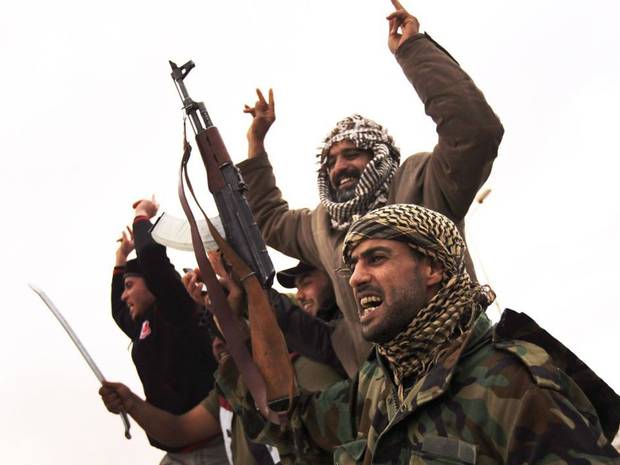
Since Gaddafi’s demise, Libya has become virtually ungovernable, with myriad militias proliferating and demanding autonomy in their respective areas. Created during and after the uprising, the militias have evolved into a patchwork of rival political blocs representing, in part, the western region around Tripoli, the mountain town of Zintan and the city of Misrata.
The militias have repeatedly challenged the government, touching off fighting across Libya. Last November, for example, Tripoli was thrown into chaos when more than 30 people were killed and almost 400 wounded in freewheeling gun battles.
The government of Prime Minister Ali Zeidan, who was briefly kidnapped last October, has tried to quell the violence by coopting the militias into the ranks of the army and police, but this ploy has been only partially successful.
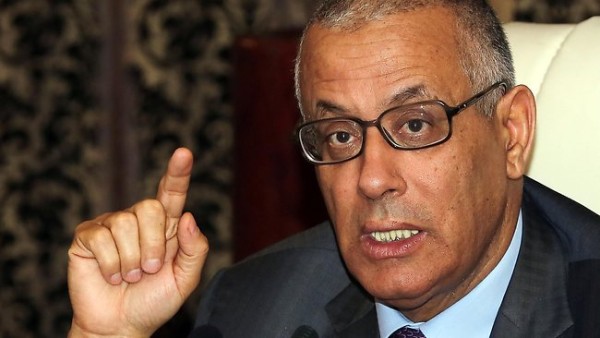
Last December, the militias pulled out of major cities, but they continue to exert influence. For the past six months, militias in eastern Libya have seized oil wells and oil terminals in a bid to assert autonomy from the central government. Militia leaders claim the seizures are necessary because the western elite in Tripoli has siphoned off the natural wealth of eastern Libya.
This is a disturbing development, since 90 percent of Libya’s revenues are derived from oil and gas production. Zeidan has threatened to crack down on the militias, but he has not followed through.
Libya has also been convulsed by a wave of abductions and assassinations targeting police and army officers. The lawlessness is presumed to be the work of Islamic radicals, who’ve benefited from the political vacuum.
Last November, the deputy chief of Libya’s intelligence service was kidnapped in Tripoli. And in Sirte, in January, the deputy minister of industry was killed by gunmen, in the first assassination of a senior government figure since the civil war. Observers believe he was either murdered by Gaddafi’s associates or by Islamic extremists, who despise the secular transitional government.
The instability that afflicts Libya today was probably exemplified by a single incident that unfolded in Benghazi in 2012 — the deadly attack on the U.S. mission that claimed the life of the American ambassador to Libya, Christopher Stevens, and several officials.

According to a U.S. Senate Intelligence Committee report released on Jan. 15, the attack was opportunistic rather than coordinated, and was carried out by individuals affiliated with Al Qaeda, which brought down the World Trade Center in Manhattan on Sept. 11, 2001.
The report held Hillary Clinton, the then U.S. secretary of state and a possible Democratic presidential candidate in 2016, ultimately responsible for the lax security at the diplomatic compound. Since then, Clinton has called the attack the “biggest regret” of her four-year tenure as secretary of state.
U.S. commandos, in a raid on Libyan territory last October, captured an Al Qaeda leader suspected of planning the attack that resulted in Stevens’ death. The attackers, however, remain at large. The Libyan government condemned the raid, though the Libyans reportedly had prior knowledge of it.
Libya, though, lent its cooperation to an American campaign to destroy the last remnants of Gaddafi’s arsenal of chemical weapons. The destruction of this stockpile is widely regarded as one of the bright spots in an otherwise dismal security situation in Libya.
